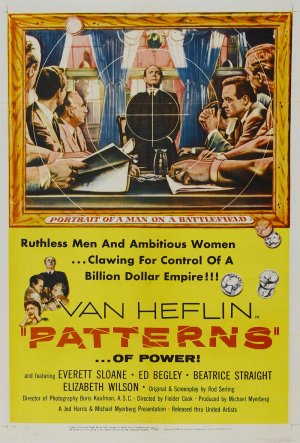 Patterns has little right to be any good. It takes place almost exclusively in interiors. Boardrooms, offices, hallways, at desks, and in elevators. But thanks to a fantastic teleplay from Twilight Zone mastermind Rod Serling, this little picture exceeds the meager expectations placed on it. In fact, it was a major hit when it came out as a live television drama, so successful that it was performed a second time and subsequently developed into this film version.
Patterns has little right to be any good. It takes place almost exclusively in interiors. Boardrooms, offices, hallways, at desks, and in elevators. But thanks to a fantastic teleplay from Twilight Zone mastermind Rod Serling, this little picture exceeds the meager expectations placed on it. In fact, it was a major hit when it came out as a live television drama, so successful that it was performed a second time and subsequently developed into this film version.
The plot on its own is ridiculously simple. Ramsey and Co. is a major business corporation housed in a 40 story highrise in New York City with bellboys, secretaries, intercoms, and every convenience imaginable. Really the whole nine yards.
The company’s head is the ruthless Mr. Ramsey (Everett Sloane) who inherited the empire from his late father and has subsequently looked to increase the companies fortunes in the very growing and competitive market at hand. Impressed with the acumen of a small town but nevertheless, shrewd businessman named Staples, Ramsey has the up and comer brought in to bring fresh ideas to the table. Immediately he confirms his previous assumptions that Staples is intelligent, assertive, and a genuine asset.
However, after an initially warm welcome to the company with all the pleasantries exchanged and the like, Staples gets his taste of the companies board meetings. It’s a place where wars are waged and Ramsey looks to continually exert his dominance on the company in an effort towards ever increasing progress. But there’s one man who is constantly at odds with Ramsey or at the very least disillusioned. After all, he’s worked with Ramsey long enough. He knows what the man is capable of and what he will not allow.
Year after year he has brought suggestions and compromises before Ramsey on behalf of the welfare of their workers only to be quashed by Ramsey’s own ruthless initiative and unfeeling business practices that idolize a dollar over anything else. Although Briggs (Ed Begley) is still around and he’s aided by his faithful secretary Ms. Fleming, his health is failing and his home life with his young son has suffered greatly due to years of chronic workaholism.
There’s also an impending sense of doom that hangs over the plot. It’s hard to put a finger on just what it is exactly but there’s no doubting that something insidious is going on in the background. It’s that precise wrinkle that most overtly suggests that this is a story from Serling’s ever innovative mind. It’s far more than it’s simple face value.
And really the underlying tension of the film–the ensuing drama that leads to be verbal, interpersonal, and psychological torment, all falls on the film’s three main leads and they shoulder the weight capably. Everett Sloane, best remembered for Citizen Kane now has ice flooding his veins giving a near maniacal performance which he somehow still tempers with passing moments of goodwill and personability. Ed Begley could always be counted on in supporting roles and this is perhaps his most stirring and tragic performance as we watch him falter. Fielder Cook is an adequate if not remarkable director but in his most interesting shot, he chooses to allow the audience to see the world as Bill Briggs does in his most vulnerable moment.
Van Heflin, also delivers another solid performance opposite his compatriots as our ambitious every man who nevertheless gets caught up in politics. Looking to keep his wife happy and especially Mr. Ramsey while still not losing grasp of his ideals. In many ways, he’s acting as the fulcrum with Ramsey and Briggs on either end seesawing back and forth on this corporate battlefield. It’s up to the audience to gather which way he’ll go. Still, by the end of the film, the verdict is still out on where he stands on this moral plane.
But it all goes back to Serling’s rousing dialogue because despite the stagnant nature of most every scene they still manage to be vibrant and impassioned. The closest approximation in recent memory is a script like Aaron Sorkin’s The Social Network. Patterns likewise showcases how quality screenwriting can bolster a film to great heights.
3.5/5 Stars
